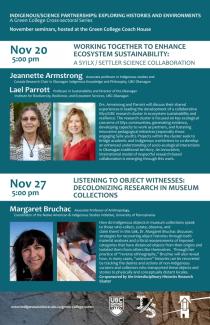Decolonizing Research Practice: Exorcising Anthropology’s Demons
November 27, 2019, 5:00 pm to 6:30 pm
How do Indigenous objects in museum collections speak to those who collect, curate, observe, and claim them? Material traces and techniques obviously reflect particular ecosystems and eras, but do these objects also retain memories of their component parts, of the artisans who created them, and of the intentions spoken into them? Can certain objects communicate across cultural and temporal boundaries, or between human and other-than-human beings? In this talk, Dr. Margaret Bruchac discusses strategies for recovering object histories through both material analyses and critical reassessments of imposed categories (e.g., art, artifact, trade good) that have distanced objects from their origins and isolated them from others like themselves. Case histories will feature new research into iconic creations – such as a 17th century wooden war club embedded with brass and wampum, and a shell bead wampum belt with a single glass bead – that function as “object witnesses” to entangled colonial settler/Indigenous encounters. Through her practice of “reverse ethnography,” Bruchac will also reveal how, in many cases, “unknown” histories can be recovered by tracking the desires and actions of non-Indigenous curators and collectors who transported these objects and stories to physically and conceptually distant locales.

Dr. Margaret M. Bruchac is an Associate Professor of Anthropology, Coordinator of Native American and Indigenous Studies, and Associate Faculty in the Penn Cultural Heritage Center at the University of Pennsylvania. She is also a consultant to the Center for Native American and Indigenous Research at the American Philosophical Society, and Director of “The Wampum Trail,” a restorative research project designed to reconnect wampum belts in museum collections with their related Indigenous communities. Bruchac is co-editor, with Siobhan Hart and H. Martin Wobst, of Indigenous Archaeologies: A Reader in Decolonization (Left Coast Press 2010). Her new book – Savage Kin: Indigenous Informants and American Anthropologists (University of Arizona Press 2018) – was the winner of the Council for Museum Anthropology Book Award.
This talk is the third in a lecture series titled Indigenous/Science: Partnerships in the Exploration of History and Environments hosted at Green College. For other talks in this series, click here.

